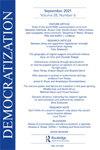反独裁:捍卫民主的路线图
IF 2.9
1区 社会学
Q1 POLITICAL SCIENCE
引用次数: 0
摘要
世界上许多民主国家面临着民主衰退和独裁的挑战,民主选举的现任者日益表现出独裁倾向。现有的研究主要集中在这些专制的在位者侵蚀民主的情况下,以及解释民主制度弹性的结构性因素。人们对这些机构中的行为者知之甚少,也不知道他们什么时候站出来反对专制的现任者,捍卫民主。在本文中,我们提出了一个新的民主防御理论框架,其重点是现任者、制度精英和公民之间的相互作用。我们建立了民主防卫的两级模型,展示了民主防卫者的个人利益、现任者的压制、专制行为的感知模糊性以及民主防卫者的感知可信度如何相互作用,影响民主防卫的发生。由此产生的框架可以指导未来对特定行为者在捍卫民主方面的作用的研究。我们通过对塞内加尔(2011-2012年)和波兰(2017-2018年)(试图)民主防御的说明性案例研究来展示我们框架的实用性。以行动者为基础的民主防御方法对于了解国内和国际行动者可以采取什么行动来防止(进一步)民主衰退至关重要。本文章由计算机程序翻译,如有差异,请以英文原文为准。
Countering autocratization: a roadmap for democratic defence
Many democracies around the world face the challenge of democratic recession and autocratization as democratically elected incumbents increasingly show autocratic tendencies. Existing research has mainly focused on the circumstances under which these autocratizing incumbents erode democracy and on the structural factors explaining the resilience of democratic institutions. Much less is known about the actors within those institutions and when they stand up against the autocratizing incumbent to defend democracy. In this article, we present a novel theoretical framework of democratic defence that focuses on the interaction between the incumbent, institutional elites, and citizens. Developing a two-level model of democratic defence, we show how the democratic defender’s personal interests, repression by the incumbent, the perceived ambiguity of the autocratic action, and the perceived credibility of the democratic defender interact to affect the occurrence of democratic defence. The resulting framework can guide future research on the role of specific actors in defending democracy. We demonstrate the utility of our framework with illustrative case studies of (attempted) democratic defence in Senegal (2011–2012) and Poland (2017–2018). An actor-based approach of democratic defence is crucial to understand what actions domestic and international actors can take to prevent (further) democratic recession.
求助全文
通过发布文献求助,成功后即可免费获取论文全文。
去求助
来源期刊

Democratization
POLITICAL SCIENCE-
CiteScore
6.40
自引率
12.50%
发文量
73
期刊介绍:
Democratization aims to promote a better understanding of democratization - defined as the way democratic norms, institutions and practices evolve and are disseminated both within and across national and cultural boundaries. While the focus is on democratization viewed as a process, the journal also builds on the enduring interest in democracy itself and its analysis. The emphasis is contemporary and the approach comparative, with the publication of scholarly contributions about those areas where democratization is currently attracting considerable attention world-wide.
 求助内容:
求助内容: 应助结果提醒方式:
应助结果提醒方式:


